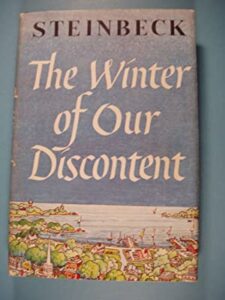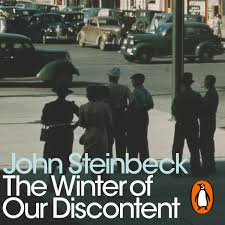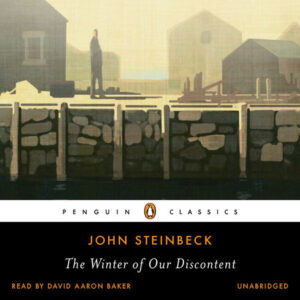The Winter of Our Discontent: Mind’s Accommodation to Disparate Experiences
TRANSCEND MEMBERS, 30 Jan 2023
Anthony J. Marsella, Ph.D. – TRANSCEND Media Service
A Personal Essay
MIND, MEANING, CHANCE . . .
I awoke at 4:00 AM on Wednesday, January 3, 2018, my uncovered arms cold from exposure to the night’s temperature. With no apparent prompt, other than the cold temperature of Winter, the words “The Winter of our Discontent” entered my mind, subsequently refusing to leave, repeating the words to me for hours amid activities of the day. The words were to remain with me for years, as a source of inquiry into meaning.
I was entering a compelling journey of my Mind’s “accommodation” of seemingly disparate and unconnected life experiences. On their own, each experience, present as an image, memory, thought, pulsing problem presence, was confronting my personal life and World. I was confused. Each experience’s cognitive and emotional residue raced across my mind, becoming sources of tension, distress, discontent.
It was a disconsolate! My mind was not yet alert to the day. Still, a phrase I had seldom used from past reading, now captured my mind in an obsessive presence. I recall grinning at the irony of my life at the moment, and the phrase’s emergence. Why now? It was not until much later in the day, buoyed by a cup of coffee, I understood there was a resonance between the moments of my distress and the iconic phrase.
The phrase now assumed a life of its own, calling, cajoling, enticing me to fix its presence in my Mind, no longer as a whimsical phrase to be used in opportune moments when friends and student spoke of difficulties in the Winter season. The phrase had now become a “raison de etre!” It was to be a seductive source for more three years.
Shakespeare and Steinbeck! Both entered my life at different points in my reading, teaching, and philosophical musings, each with memorable and enduring words. I memorized some of their lines in staccato searches for insights into life’s array of challenges. As the days progressed from the January 3, 2018 anchor date, I grew fond of the evocative phrase: “The Winter of Our Discontent,” sensing in its brevity, the many associations it elicited.
“The,” a singular identity! “Winter,” time, season, dreary, cold! “Of,” a cause! (Merriam Webster Dictionary)! “Our,” ownership or possession! “Discontent,” dissatisfaction dislike! In a phrase, an associative web, each word bringing meaning, emotion, insight.
My mind was at play! In my ignorance of “Mind’s” nature, functions, and existence, I had failed to grasp Mind’s constant effort after meaning, integration, synthesis, synchronicity. Mind’s was engaged in organizing and harmonizing disparities, those incessant bewildering conflicts forcing us to choose. In choosing, there was the risk of losing the magnificence of opposites, the wisdom of doubt, the nature of being. I was now caught in a “magical” journey of Mind’s primary capacity for accommodation, an accommodation of content, function, and consequence.
To this day, I remain in awe of my journey’s complex process of organizing diverse events around a single phrase: The Winter of Our Discontent. This poetic phrase, made famous in literature by John Steinbeck and William Shakespeare, had become master of my life, compelling me to pursue its meaning for me. I could not resist its siren call.
I found myself placing aside daily demands, tasks, and interests, in favor of studying and composing words and phrases, again and again. Over the course of months in my journey, I recognized Mind’s inherent tendency, perhaps basic principle, to gather, sort, and harmonize experiences.
For me, Mind, from the early moments of my awakening on January 3, 2018, was alert to my condition, my discontent, and was engaging in constructing an acceptable reality, an accommodation, temporary at best, but a foundation for moving on. It was mind’s constancy, never resting, responsive to situation and enduring remnants.
Initially, I neither recognized nor understood “Mind has a Mind of its own!” It is a simultaneous process/product directed toward describing, understanding, predicting, and controlling the World in an effort after survival. It was, however, more than an effort after survival, it was an effort after personal meaning, purpose, and fulfillment. My mind, in sleep and wakefulness, was processing, organizing, and storing information across billions of neurons and their connections with intent toward finding and sustaining meaning.
THE SEARCH FOR MEANING: HUMANKIND’S ETERNAL . . .
Humankind’s history reveals the search for meaning to be an eternal quest across cultures, and space and time. Belief systems, rituals, institutions represented this quest. In some instances, stifling growth and change, insisting on stasis, rejecting the tensions of doubt, creating the “True Believer” syndrome, described so well by Eric Hoffer, and others who studied the Authoritarian Personality.
Once a person becomes totally committed to a belief, leaving no room for doubt, the belief becomes a habit, and the habit becomes a personality style replete with fixed identity. Meaning is the goal of the search, but meaning can capture reason. At the very moment of passionate adherence, doubt must be present, distressing with its questioning.
Many writers have understood this inherent impulse for making meaning. Viktor Frankl, the NAZI Concentration Camp survivor who later wrote a classic volume, Man’s Search for Meaning, in which he suggested the core motivation for humankind was the search for meaning. Much of his work has been continued by Professor Paul Wong and his associates. Frankl went on to develop Logotherapy, representing a therapeutic process for finding meaning, purpose, and fulfillment.
My training in clinical psychology, especially psychodynamic therapies, had exposed me to Frankl and other therapists and therapies. Initially, Freudian psychoanalysis appealed to my byzantine mind’s efforts after personal meaning. Subsequently, however, I was exposed to Carl Jung’s therapies, and found them deeper and richer in terms of my life questions.
I was fond of Jung’s concepts of “Archetypes,” especially the “Unitary Archetype” which connected me, humanity, and the World across time and place. There was a “Oneness” and with that, “Synchronicity,” a felt, intuitive connection among events which seemed to have no obvious connection, yet, certain events seemed beyond chance. There were felt linkages, without apparent known connection. “Synchronicity” challenged “Mind” to engage in its distinct and unique process/product course, which was more than Brain’s neural networks, which I considered to be mechanistic in their purpose.
In time, as the phrase “The Winter of Our Discontent” worked its magic affirming experiences, justifying associations, and pursuing integration, I began to experience an elan vital state of mind. I was alive in the process, part of the process, yet driven by a force comforting and pleasuring me.
Was the process/product in accord with a broader cosmic design seeking order, coherence, and lawfulness amid limited human perceptions. Humanity had, throughout its history, beheld a wonderous chaos amid the billions of galaxies, billions of universes, all involved in constant creation of matter, energy, radiation, and more. This very process/product was a manifestation of life itself, beyond the “life” associated with our limited notions of Earthy life.
I thought of the many pressures I faced. Was a cosmic “life force” now compelling me to resolve my psyche’s disparate concerns, tensions, and strains, and to move toward a holistic and coherent awareness characterized by an accommodation, a temporary coherent consolidation, a respite, an acceptable answer, only to be challenged by yet another disturbance in stasis.
As I awoke on a cold winter day, exhausted anticipating the demands of the day, I had no awareness the words, “The Winter of our Discontent,” were to guide me on a journey bringing me a new level of personal understanding and a new appreciation of literary insights. I was on a mind journey to accommodate a spectrum of troublesome unfinished, unresolved thoughts, each rearing its head, demanding attention, amid a broader array. I was in need of a new identity, a new comfort zone, bringing me fulfillment. I was at the time a scattered puzzle spread on a table, end pieces visible, but not connected.
SITUATIONAL IMMEDIACY . . .
In the immediacy of the day, I tried to escape the hold of the phrase, “The Winter of Our Discontent”, on my mind. I needed to prepare for a complex outpatient surgical procedure. The surgery disrupted my practices routines, as I was instructed to avoid all water and food. Further, I must arrange for transportation, because anesthesia would leave my mind cloudy. There were also concerns for prescriptions, transportation, and the incessant signing of medical permission forms. I was on January 3, 2018, amidst all other concerns, prisoner to endless corporate requirements and regulations: Sign here, initial here, did you read this page? Do you understand HIPA?”
I wanted understanding and compassion, but was subject to formality, distance, and indifference. Lurking in the background of my mind, the poignant poetic words, The Winter of Our Discontent, were already understandable. In the world of corporate medicine, I was pieces for their puzzle, a patient, a number, a bed, a case with a folder, but not an anxious human being, in need of affirming care..
In the background of my mind loomed the repetitious words: The Winter of Our Discontent. For no apparent reason, I recalled an Eastern European friend’s suggestion I read the famous Russian author, Mikhail Bulgakov’s, The Master and Margarita. Why recall this now? Why in this moment? Bulgakov’s classic was written amid rampant Stalinism, replete with oppression, brutality, atheism, and a crushing of individualism.
I recalled my Eastern European friend’s smile at my American naivete regarding suffering and the human condition under oppression:
“What do you Americans know?” Can you know what it means to live each day in fear you, or your family may be arrested, and sent to Siberia? Can you know what it means to distrust everyone because they have been co-opted in mind and spirit by compliance to beliefs designed to eliminate protest in favor of conformity to mass society?
I recalled I bought a paperback version of Bulgakov’s masterpiece, at my friend’s suggestion, delighting initially at the erotic title and cover. I expected an introduction to ponderous Eastern European mentality, and I prepared for the all-knowing Eastern European cynical grin, holding Americans in disdain, because of America’s unrestrained optimism and innocence. HOW does Mind make meaning, find meaning, confirm meaning, under circumstances of ideological oppression to which Mind is prisoner.
Mass surveillance, monitoring, and archiving of all personal data had yet to become commonplace in America. In time the USA system of surveillance and storage of data would equal that of Eastern Europe. There was an awareness the FBI under J. Edgar Hoover had violated ethics and laws at his personal pleasure, likely engaging in assassinations of prominent individuals he considered traitorous to his values and beliefs.
A law suit by Martin Luther King’s (Jr.) family brought confirmation of government involvement in MLK’s assassination. It was ordered by Hoover. Hoover had asked MLK, Jr., to commit suicide or risk exposure of sexual dalliances. The cover was off the USA’s efforts after control and domination of citizenry in direct violation of the USA Constitution and legal regulations protecting human rights. Trust was lost! A new reality was required. Government betrayal of laws and rights added to my identity issues. Was I an American citizen, or a number awaiting control?
I recalled I started to read The Master and Margarita, years ago, and then stopped! The novel was too much for me. It was not enjoyable reading. It was heavy, requiring attention to each word. I gathered bits and pieces from my reading, especially the phrase: “Manuscripts never die!” The genre description of “magical realism” was, however, beyond my understanding. It was the early 1980’s, I was too young and inexperienced. How could I fathom Bulgakov’s purposes? Why now did I recall the volume?
On January 3, 2018, early in the morning, I encountered American mass society; surveillance, no privacy, and a new USA president, of unusual and unpredictable style and values. The intruding words: The Winter of our Discontent, began to make a semblance of sense. Was my pre-occupation with the human condition and my nation’s directions a corresponding coincidence? Was it an effort of to alert me to changing times requiring a new understanding and construction of reality? The Winter of Our Discontent, had become a mantra for me, encapsulating much more than the surgery’s immediacy of the moment.
Winter’s merciless assault upon Atlanta, rendered the South and me powerless. I was “discontent!” Relentless record-setting snow, cold, and wind, descended from the Artic; a winter cyclone bringing destruction and “discontent.” The weather itself was sufficient cause for “discontent.” “Winter of our discontent … winter of our discontent …”
The Nation was in “discontent!” It was the best description of an endless human condition of suffering and hopelessness across the world. It was not rage, anger, or contempt for government abuses alone, it was not visible corporate exploitation, military dominance, presidential unpredictability. Discontent was an acceptable word! Discontent defined the entire experience of my life in this exact moment.
A stream of thoughts arose as I sat in my hospital bed, awaiting surgery. There was much “discontent” for me in the ending of year 2017: ageing burdens, time’s tolls, pressing legal decisions, unresolved family matters, financial worries, and the omnipresent thought of meaning and mortality.
What I did not expect, however, was the bubbling recurrence of the words: “Winter of Our discontent.” The words began upon awakening and remained with me through the day. A coincidence? I began to question the reason. I wanted to understand the cause and implication of the compulsive presence of words.
As I pondered my preoccupation with the words “Winter of Our Discontent,” I recalled logic’s cautionary adage: “An apparent cause may be necessary, but insufficient!” How can we know unless we are willing to doubt its sufficiency! Doubt! The essence of change; the work of the devil, claim fundamentalist true believers! Do not doubt! Believe! Comfort in blind belief!
I was “discontent!” Perhaps I should not be, but I was! The phrase captured so much, summarizing many of my past, present, and future concerns. I was caught now, compelled to reconcile accumulated memories for 77 years, three months or 123 days, and a few hours more or less.
Whatever the cause . . . I was now “discontent,” unsatisfied with explanations as they emerged. The question of “why” these poignant words arose and lingered, became for me an unanticipated journey. Could I find closure? Could I find comfort? I had been pushed into a discomfort zone; I needed to be pulled into a new comfort zone. There to find respite, if only for a time.
My training in psychoanalysis would not release me. Unconscious motives! Symbolic motives! I was on a journey. It was to be a personal journey pursuing meanings, images, and associations. On with the journey!
Up pop the names John Steinbeck and William Shakespeare, both aware of the many associations of term: “The Winter of Our Discontent.” For Steinbeck, this was the title of book describing the destructive tolls of personal ambition. For Shakespeare, the words were key to his play, Richard III, a tragedy of regal proportion, in which “discontent” is omnipresent.
WILLIAM SHAKESPEARE AND JOHN STEINBECK
An unlikely pair, perhaps: living in different centuries, different writing styles, different talents, different causes. Different causes? Hmmm? Maybe!
On to William Shakespeare (1564-1616), and his play, Richard III, published in 1592 (1594?). William Shakespeare, in history/tragedy play, Richard III, presents a moving account of despicable of human qualities: quests for power, wealth, status at any costs, including, if required, murder of family members.
The glorious words, “Winter of our discontent,” now occupying my mind, were first penned in a commentary of Richard’s (Son of York) dastardly ways:
Now is the winter of our discontent, made glorious summer by this son of York . . . (i.e., Richard III)
Shakespeare’s words, appealed to me amid a vanishing Winter “Season,” exerting its “discontents” by endowing nature with endless snow, gale winds, and freezing temperatures bring suffering to life. Ahhh! Insight!
Richard III’s deformed in body because of scoliosis, his demented mind, driven by lust for power, position, and wealth, regardless of consequences captured the character in all its discontents. In the play, Edward II is murdered, and Richard III assumes the throne, murdering his nephews to prevent them from ascending to the throne.
And then, Richard chose to fight and destroy, Edward III, in the famed battle of Bosworth Field. Ambition was to kill Richard, and he was to die on the field.
Richard III: A horse! A horse! My kingdom for a horse!
Catesby: Withdraw my lord, I’ll help you to a horse.
Richard III: Slave, I have set my life upon a cast,
And I will stand the hazard of the die.
Some authorities believe Richard III was not, in fact, as evil as Shakespeare painted him; however, Shakespeare needed a foil, and Richard III was perfect for the part. A disconsolate man, driven by discontent, willing to chance a battles’ outcome, now victim to chance.
For Shakespeare, “Now is the winter of our discontent . . .” introduces audiences to society’s (humanity’s) disdain for fate’s unfolding tragedies. The words acknowledge the endless struggle for wealth, power, position, valued by society, and the harsh the consequences exacted upon those who pursue these status markers.
There is an amazing application of this struggle for our times which are filled with corruption, betrayal, violence, villainy. Shakespeare’s words are immortal! Shakespeare’s brilliance in describing a human character’s struggles, endure across time and place.
Shakespeare’s immortal words return to modern times, with similar appeal and insight, as the title of John Steinbeck’s (1902-1968) Nobel Prize winning novel, The Winter of our Discontent (1961).
I recall reading with pleasure, Steinbeck’s novel years ago, as my former wife, a Professor of English, spoke of the novel and had a copy in her library. Steinbeck offers a rich narrative of the hapless pursuit of wealth, power, and position.
Literature’s synchronous nature brings readers delight as coincidence recedes amid the awareness human nature spans the centuries. The same struggles! The same joys! The same faults! Ambition in the presence of flawed character. Or does ambition flaw character?
Literature was now becoming a critical part of my journey. The words, the title, the evocative images of life and season connect, affirming flaws human nature across time.
John Steinbeck (1961) The Winter of our Discontent
My Journey Became a Dance with Literature: John Steinbeck and Shakespeare:
John Steinbeck (1929, wrote his Nobel Prize winning novel, The Winter of Our Discontent, to express his “discontent” with the moral degeneration of America in the 1950s and 1960s. With his sharply honed sense of injustice in American society, Steinbeck was sensitive to changes pressing for conformity to USA popular culture, especially consumerism, greed, materialism, capitalism, and, more than anything, a passive acceptance of emerging government secrecy and abuses, betraying citizen rights and laws.
I too, decades later from Steinbeck’s writings, had discontent. Things were coming apart seeking resolution. I needed a phrase to organized my disparate thoughts and tensions. There was a need for accommodation. Scattered thoughts in need of order.
Steinbeck wrote in the time of Martin Luther King Jr.’s protests and assassination. It was also the time of the assassinations of John Fitzgerald Kennedy and Robert Kennedy, and the defamation of hundreds of citizens as “Communists” by Senator Joseph McCarthy’s witch-hunt.
It was also the time of revelations of J. Edgar Hoover’s many abuses and his launching the nefarious and treacherous CO-INTEL-PRO (Counter Intelligence Program), used to surveil, infiltrate privacy, and condemn scores of individuals and domestic political organizations deemed radical and dangerous.
For the villainous Herbert Hoover, anyone disagreeing with government propaganda was labeled a “communist,” “terrorist,” or threat to the USA national security (Hoover had become the arbiter). This would become the political, social, and economic, moral fractionation basis of our times. Hoover, more than anyone, assumed an independence from government control, establishing himself as arbiter of morality, even as he was one of the most immoral human beings of all time.
Steinbeck could not remain silent; in his volume, Grapes of Wrath, he was speaking against mass injustices. Initially, Steinbeck’s moralism in Grapes of Wrath, was dismissed amid post-war years exuberance. America was on a roll, celebrating military, political, and economic ascendancy. How dare any one question, America? Then, questionable assassinations, the Watergate Scandal, and other events led to a reconsideration of Steinbeck’s work, and his genius and courage. The USA was not what it seemed to be following years of media propaganda. It was a mockery of democracy and justice.
The parallels between Shakespeare’s Richard III, set in 16th Century England, and Steinbeck’s novel, set in contemporary times, illuminate the timeless flaws in human character and human condition. Wants exceed needs! Unrestrained ambition brings an inevitable fall from grace.
Is this the eternal Hebrew Bible’s curse of Adam and Eve’s denial of ordained rules, offered by an unknown power, warning disobedience will bring harm. Were lessons of human frailty and possibility across time relevant to my existence as I arose on a cold winter day with the resounding words “Winter of our discontent,” echoing in my mind.
I ate no apple! I heeded no serpent! My life, however, was in turbulence. I was caught in the tides of the time, my discontent a harbinger of society’s pathology shaping mind. I was now immersed in a struggle accommodate my idealistic values, character restraints, and personal ambitions within a changing world. Social and cultural changes had become overwhelming, exceeding my capacity to grasp their consequences. I needed respite! I needed understanding! I was living amidst a “Winter of Discontent.”
Critics, interpreters, and learned scholars have suggested Richard III is a morality play speaking to tensions between destiny, determinism, fatalism, and free will (i.e., choice), or moral choice (Note: resurgence of Calvinistic beliefs of the times). “Who” or “What” is responsible for behavior characterized by murder, deceit, lies, greed, jealousy, and untethered ambition. Is it person or times? Or is it a “person in times,” in which a reciprocal ecology develops seeking accommodation?
In Richard III’s deformity from scoliosis reside a resentment of his condition; it is beyond discontent! It is anger, regret, and a deep anguish:
I, that am rudely stamp’d, and want love’s majesty
To strut before a wanton ambling nymph;
I, that am curtail’d of this fair proportion,
Cheated of feature by dissembling nature,
Deformed, unfinish’d, sent before my time
Into this breathing world, scarce half made up,
And that so lamely and unfashionable
That dogs bark at me as I halt by them;Why, I, in this weak piping time of peace,
Have no delight to pass away the time,
Unless to spy my shadow in the sun
And descant on mine own deformity:
And therefore, since I cannot prove a lover,
To entertain these fair well-spoken days,
I am determined to prove a villain.
JOURNEY’S END, JOURNEY’S BEGINNING . . .
I had come to an acceptable end for my journey. The echoing of a few words upon arising on a cold winter morning, puzzling in their presence beyond the initial immediacy of the situation, had become a more deliberate search for the meaning. A journey was launched. A phrase had brought an accommodation for my mind, ordering disparate experiences. I was now aware of principles of mind, born perhaps in cosmic creation efforts, to bring harmony from discord, order from chaos, capable meaning from disparate noise.
The phrase, “The Winter of Our Discontent” had become a synthesizing accommodation, a poetic anchor, in which my personal life situation, replete with its uncertainties and anxieties, crystalized! I sensed at an intuitive, but tangible level, new insights into my personal life search for identity, comfort, meaning, and doubt. I also recognized the power of the times to dominate, control, and shape lives left passive amid confusion, a silent conformity to forces controlled by a society and culture now desperately seeking control of human choice. Hegemony! Mass Society! Dystopia!
A “chance” awakening with a distant literary phrase of poetic beauty had entered my mind upon awakening and remained to organize disparate and bewildering thoughts and needs. I wanted inner peace! I wanted to resolve tensions! Ahhhh, Mind doeth sense the struggle, and moves to accommodate.
Though self-disclosure began in the morning on January 3, 2018, it has come to its full personal meaning on May 19, 2022, as I write on a number of topics regarding “extinction,” and endless global challenges. I am content. This article remained (rested?), incomplete, unfinished, for years in a document folder entitled “Unpublished Writing.” “The Winter of Our Discontent,” now lives in a new way in my mind. . . and heart.
___________________________________________
 Anthony J. Marsella, Ph.D., a member of the TRANSCEND Network for Peace Development Environment, is a past president of Psychologists for Social Responsibility, Emeritus Professor of psychology at the University of Hawaii’s Manoa Campus in Honolulu, Hawaii, and past director of the World Health Organization Psychiatric Research Center in Honolulu. He is known internationally as a pioneer figure in the study of culture and psychopathology who challenged the ethnocentrism and racial biases of many assumptions, theories, and practices in psychology and psychiatry. In more recent years, he has been writing and lecturing on peace and social justice. He has published 21 books and more than 300 articles, tech reports, and popular commentaries. His TMS articles may be accessed HERE. Emails: marsella@hawaii.edu or ajmarsella@gmail.com
Anthony J. Marsella, Ph.D., a member of the TRANSCEND Network for Peace Development Environment, is a past president of Psychologists for Social Responsibility, Emeritus Professor of psychology at the University of Hawaii’s Manoa Campus in Honolulu, Hawaii, and past director of the World Health Organization Psychiatric Research Center in Honolulu. He is known internationally as a pioneer figure in the study of culture and psychopathology who challenged the ethnocentrism and racial biases of many assumptions, theories, and practices in psychology and psychiatry. In more recent years, he has been writing and lecturing on peace and social justice. He has published 21 books and more than 300 articles, tech reports, and popular commentaries. His TMS articles may be accessed HERE. Emails: marsella@hawaii.edu or ajmarsella@gmail.com
This article originally appeared on Transcend Media Service (TMS) on 30 Jan 2023.
Anticopyright: Editorials and articles originated on TMS may be freely reprinted, disseminated, translated and used as background material, provided an acknowledgement and link to the source, TMS: The Winter of Our Discontent: Mind’s Accommodation to Disparate Experiences, is included. Thank you.
If you enjoyed this article, please donate to TMS to join the growing list of TMS Supporters.

This work is licensed under a CC BY-NC 4.0 License.




Just mentioning:
It’s a fine article.
Unfortunately, Dr. Marsella’s email address is incorrect (or my computer is suffering its own “winter of our discontent”).
I’d like to engage the good Doctor in our own mind-wrestling bout.
Any lucidity cast on this dilemma would be appreciated!